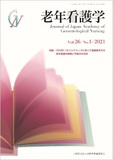Japanese
English
- 販売していません
- Abstract 文献概要
- 参考文献 Reference
抄録
高齢者の免疫の低下がCOVID-19感染の重症化に拍車をかけている.COVID-19の重症化のリスクを明らかにするためにスコーピングレビューを行った.重症化のメカニズム―サイトカインストームについてまとめ,COVID-19と高齢者のフレイル,認知症との関係について考察した.結果:重症化のリスクは,呼吸器疾患,高血圧,糖尿病などの基礎疾患,80歳以上の加齢,臨床所見としてNEWS;national early warning score,CRP,フェリチン,GPT,eGFR,せん妄,フレイルであった.フレイルは,多因子を調整しても生存率に影響する重要な因子であった.一方せん妄は,重症化の因子として肯定する論文と生存率に影響する因子としては否定する論文の2つがあり結論はでなかった.しかしせん妄は認知症の重症化の予兆のひとつと考えられ早急な対応を考える必要がある.高齢者施設の対応として,酸素飽和度の測定と必要に応じた酸素供給,呼吸器管理の徹底,ソーシャルディスタンスでのうつなどの対策,身体活動不活発対策が引き続き重要である.
A scoping review was conducted to clarify the risk of severity of COVID. The mechanism of severity, the cytokine storm was summarized and the relationship between COVID and frailty syndrome and dementia in the elderly was considered. Result: The risk of severity was underlying diseases such as respiratory illness, hypertension, diabetes, aging over 80 years, and clinical findings such as NEWS; National Early Warning Score, CRP, ferritin, GPT, eGFR, delirium, and frailty.
Frailty was an important factor affecting survival even with multifactorial adjustment. On the other hand, there were papers with different conclusions that affirmed delirium as a factor of severity. However, one paper denied it as a factor affecting survival rate, and no conclusion was reached. Nevertheless, delirium is considered to be one of the signs of the severity of dementia, and immediate response to delirium is desired. As measures for facilities for the elderly, it is still important to measure oxygen saturation and supply oxygen as needed, thoroughly manage respiratory organs, take measures such as managing depression in social distance, and take measures against reducing physical inactivity.
Copyright © 2021, Japan Academy of Gerontological Nursing All rights reserved.


